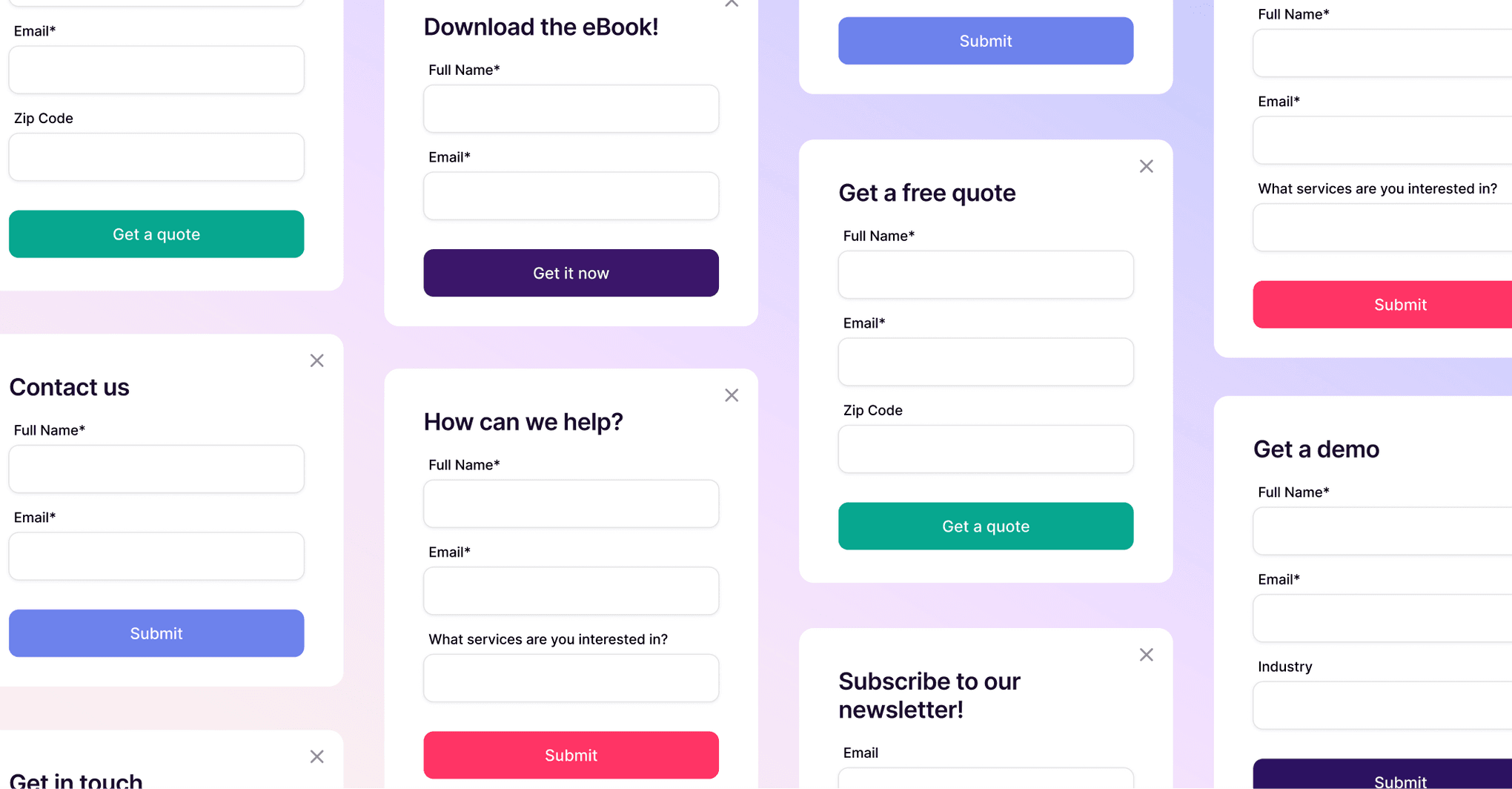Christina Scannapiego
Director, Content Marketing
How can you power your sales team with the right tools to drive success? If you haven’t tried customer relationship management software yet, it’s worth considering. While many sales teams still use email, spreadsheets and even handwritten post-its (yikes) in an attempt to keep their deals and customers straight, organizations that have found a right-fit CRM system know what a difference it can make.
If you’re wondering how to use CRM for sales, you’ve come to the right place. We’re sharing some of the biggest benefits of CRM for a sales team — plus how to use CRM software to get better sales results.
The top 7 benefits of using CRM for sales
There are lots of reasons your sales team would find value in using a CRM. Here are our top seven:
1. Track past, current and potential sales in one place
There’s nothing quite as annoying as flipping through tabs, folders and old emails to find the information you need — especially when you’re in the final stages of closing a deal. Too often, salespeople have all their critical information spread across several apps and locations and have to use an array of tools just to close one deal. To access closed sales from the same account, you might have to open a separate accounts receivable system, for example. Or say you’re a digital marketing agency; your existing clients’ projects might be in a separate project management system that your sales team doesn’t even have access to.
These disjointed tools and systems amount to a big, scary nightmare for people in sales. Which is why having the ability to track past, current and potential sales in a single place is one of the biggest benefits of using a CRM for sales.
Get the latest from our blog every month
2. Fewer lost sales opportunities
Most salespeople understand the horror of realizing they forgot about a customer follow-up and lost a deal because of it. CRM makes it much easier to keep track of deals and contacts, resulting in fewer opportunities falling through the cracks. This means more revenue, and more smashing of your sales quotas.
3. Accurate predictions of cash flow and workflows
With comprehensive sales reporting features, CRM makes it easy to track and predict cash flow and workflows. This helps your salespeople predict things like which deals are poised to close and how much work they need to do to get prospects across the finish line. Individual sales reps can also get a feel for how they’re tracking on things like sales commission, too.
4. Higher productivity
Did we mention that CRM helps enhance productivity? With the important work all happening in a single system, there’s no more wasting time switching between apps or hunting for important documents. Plus, many CRM systems have automation features and organizational features (like pipelines and follow-up activities) that make it easy to become a more productive salesperson and start closing more deals.
5. Greater insight into sales processes
Keep tabs on what’s working and what isn’t so you can continually refine strategy. With granular sales data, sales managers gain a high-level view into how well their processes are working and where the team, and individual team members, can improve their efforts to hit their targets more easily.

CRM FOR RELATIONSHIP BUILDING
Build long-lasting customer relationships with ease
Try Copper free for 14 days to see how easy it is to grow business relationships.
6. Easier collaboration
CRM systems offer the most value when they’re used across multiple departments in an organization. This way, everyone has access to the same exact information, making it easy to stay on the same page about contacts, deals, marketing and more. Taking this approach to CRM helps foster collaboration both inside the sales team and with the entire organization.
7. Better customer experience
With automated follow-ups and follow-up reminders, CRM platforms help you take better care of your customers. Built-in features like email templates and sequences help companies build, nurture, and maintain relationships with their customers — delivering a better customer experience as a result.
How salespeople use CRM for best results
If you’re wondering how to use CRM for sales, this section is for you. Let’s look at some of the most common ways that sales teams use CRM software to elevate their workflow and improve results:
Centralize contact information and activity data
Salespeople know that no customer likes to repeat themselves, and everyone wants to feel special. The difference between closing a deal and losing out on it often lies in remembering crucial details and picking up where you left off from previous interactions.
Well-developed CRM systems store contact information, text and email communication and activity data, making it easy to get quick and comprehensive insights into a client in real time. The ability to search for a specific customer or contact and access a whole history of that person’s interactions with your company helps you build meaningful relationships and keep the sales conversations moving forward.
Track deals using sales pipelines
Sales pipelines are visual representations that track potential customers as they move through the buyer’s journey. A sales pipeline makes it easy for your sales team to see what deals and opportunities to focus on and when to act on them. And customer-centric CRM platforms, like Copper, make it easy to create and manage sales pipelines.
Salespeople can use sales pipelines to:
- Organize the sales process
- Get quick insight into deals and opportunities
- Show where to focus their attention
- Predict revenue
- Close deals faster
- Enhance prospect nurturing
- And more
A peek at a sales pipeline inside Copper CRM
Plus, pipeline reports can be used to spot problem areas and improve the entire sales process.
Organize and manage stages in the sales funnel
The most common stages of a sales funnel are prospecting, qualifying, proposing, and closing. CRM makes it easy to manage all these stages. From capturing data from a fresh lead to assigning tasks and follow-ups, CRM powers up and streamlines the sales stages.
For example, with Copper you can do things like:
- Filter your best contacts to create an ideal prospecting profile
- Create email templates to speed up email prospecting
- Add lead scoring to simplify qualifying
- Compose, send, and personalize bulk emails
- And more
To sum it up, salespeople can use CRM to both create pipelines and manage the stages in those pipelines — all in one place.
Understand what is and isn’t working with win/loss reporting
If you never know what works, chances are you’ll keep making the same mistakes over and over again. CRM makes it easy to collect crucial win/loss information and conduct win/loss analyses to figure out what’s working (and what isn’t).
With Copper, we think this data is so important that we have a Sales Lost and Abandoned Report and a Sales Performance Report to help sales teams better understand the best and worst parts of the existing approach.
Automate easy tasks
Mundane manual tasks are the bane of a salesperson’s existence. They break up the flow of the day and don’t directly add to the bottom line. CRM makes it easy to automate some of those manual tasks, like:
- Follow-ups
- Follow-up reminders
- Meeting scheduling
- LinkedIn contact transferring
- Propagating leads from Mailchimp, your website and more
Automation simplifies the sales process by ensuring your sales team can focus on what matters most: building revenue.
Track sales KPIs
Salespeople who understand what’s going on perform far better than those who don’t. That’s why having access to KPI reports with crucial sales data can be highly beneficial to salespeople.
CRM platforms often come with out-of-the-box reports and the ability to track sales KPIs like:
- Lead response time
- Closing ratio
- Revenue
- CAC (customer acquisition cost)
- CLV (customer lifetime value)
- SPC (sales pipeline coverage)
- Sales funnel leakage
- Average sales cycle length
- And more
TL;DR – your sales team can use CRM to get critical data to better understand what’s happening.
Nurture relationships after the sale
Too often, we fall into the habit of thinking the deal is finished once the sale is won. But customer relationships require a long-term commitment. When you build lasting connections with customers, they’ll likely purchase again in the future or refer your product or services to others.
Salespeople can use CRM to create existing customer pipelines and nurture processes to keep strengthening the relationship beyond the sale.
Help your salespeople succeed with CRM
CRM systems are an asset to sales teams. While a talented salesperson can probably close deals without one, they’re wasting valuable time organizing, streamlining, and managing their processes, which ultimately takes away from the bottom line.
Now that you know how to use CRM software for sales, it’s time to get started with a CRM platform. Copper is an easy-to-use CRM system that works where your sales team works — right inside Gmail and Google Calendar.
With workflow automation, integrations and sales-specific features, Copper was built to help your salespeople soar.






